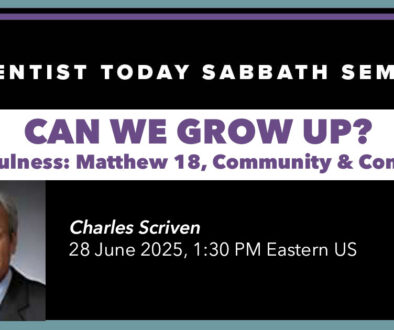Two Retired Women Spread New Life in their Community
By Debbonnaire Kovacs, Feb. 25, 2015 Earl, 82, could hardly walk. He used a cane to shuffle slowly along, very bent over. Now, though still slow, Earl stands straight, walks with stability, and uses no cane.
Doris, late 60s, heavy and diabetic, was never seen without her cane. Now she doesn’t even bring it with her.
Mary, who has bad knees and is limited by severe tremors, said this week, “I weigh five pounds less in one month, and I wasn’t even trying to lose weight!” She’s lost inches, too. Her confidence is much improved, and many things she didn’t think she could ever do, she does now.
Janice, early 40s and heavy, said “I have so much more energy now! Before, my boss was saying, ‘You are walking slower and slower.’”
What do these diverse people (and dozens more) have in common?
In part, the changes have come about because they are friends with two Adventist women: Merlene Olmstead and Carol Matlock. A year and a half ago, Matlock had, by her own estimate, become a hermit. Since her husband had died of multiple cancers a few years earlier, she “just sat at home and read.” Now she is busy and happy and says she can’t believe how much her life has changed. Olmstead described herself to me as a one-time pew-sitter. In the 1980s, teaching at Walla Walla University, she sat in the big church and “no one asked me to do things, so I didn’t. Well, we did take students bicycling, backpacking, things like that, but I didn’t help out in any divisions or anything.”
When she moved to New Mexico to teach in a university there, she vowed she would never be a pew-sitter again. Her discipline used to be called Home Economics, but when its name changed to Family and Consumer Sciences, “for some reason, that suddenly rang a bell with me. We could do so much for families! In fact, at this public university, our mission was ‘to be a source and a voice for families.’ We did so much with students, and they really stepped up to the plate. We got them involved throughout the state!”
When Olmstead retired back to Washington State, she said she’d gotten too used to sunshine to go back west of the Cascades, so she settled in Spokane. But she knew she wanted to stay involved. What could she do?
Meanwhile…
Spokane County Sheriff Ozzie Knezovich did a live radio segment in which he detailed needs in the community that were not being met, and suggested that “churches and other people of faith” might “work together with community leaders for the common good.” The sheriff was speaking to former Methodist pastor and Spokane Valley Council member Ian Robertson, and Robertson thought that sounded like a great idea. He held a Faith Summit at Whitworth University to launch a Christian Service Team. People from many faiths—according to Olmstead, over 900 of them—came to that meeting, and more than 80 congregations have said they want to be a part of it. (I heard from two individuals that Mormons and Adventists have been especially involved.)
Since that time, they are developing a five-year plan to work on four particular areas of concern: at-risk youth, neighborhood safety and security, homelessness, and wellness/health equity.
Olmstead and Matlock were at that meeting, and have also been a part of ongoing meetings. They were drawn to two of the areas: at-risk youth, and senior health. They each became a mentor to a grade-school student. Olmstead said, “This is not an academic mentorship. It’s about developing a relationship with the kids.” They go once a week at the child’s lunch hour and draw or color or paint. Olmstead says that over time, the kids especially started opening up to Matlock.
Meanwhile, they both wanted to help seniors. “We are seniors ourselves!” said Olmstead with a laugh. Her sister-in-law, a nurse, knew a woman in Seattle who had written the original SAIL program, so she made the contacts, and Olmstead then called the local director of Spokane’s SAIL, A. J. Sanders, who held a training the two women attended.
Sanders told me that SAIL is “an evidence based senior fitness/wellness program, focused on 65+ but beneficial for any age. It focuses on balance, strength, and flexibility, and has mandatory components of exercise. Trained instructors can add aerobics or other creative things as long as they do the mandatory elements. What sets us apart is that we also do fall prevention and tips, conversations about things they can do in day-to-day life to maintain independence, medication review, vision checks, and even home safety modifications.” Sanders says the program began as a research project in Washington, funded by the Centers for Disease Control, and took several years to develop into the program that it is now, which is beginning to move to other states as well (possibly not under the same name).
What now?
Matlock and Olmstead were now trained, but what should they do next? Olmstead was new in the area, but Matlock had lived there her whole life. She talked to someone she knew and asked, “How can we find out how to help seniors?”
They were told, Parks and Recreation has a weekly meal; go ask. They had permission to ask people individually what needs they had that were not being met in the community. “We ended up with three pages of stuff!” she said.
Besides the SAIL classes, just a few of the things that came from that include:
- Trips to various interesting places such as the Cat Tails Zoo (cattails.org), where big cats that have been kept as “pets” can be rehabilitated and cared for, the arboretum, craft and art museums, and Manito Park, which has “fabulous gardens from early spring to late fall!”
- A plethora of activities like bird watching, Christmas caroling and going to see light displays, and community gardening
- Simple things like singing songs after meals, and walking
- Writing and acting in their own Christmas play
Parks & Recreation says this is the biggest and best-attended program they’ve had in their history, and City Council begged Matlock and Olmstead to join the Council, giving them an office and a budget, and creating a Senior Commission, of which Olmstead is now president.
But it’s the stories that matter. The growing trust on the faces of the two women’s second- and third-grade mentees, the excitement of the people whose anecdotes began this article, and the new life they themselves have experienced. Olmstead says, “I truly believe that I am following “Christ’s method that brings true success”: “Christ’s method alone will give true success in reaching the people. The Savior mingled with men as one who desired their good. He showed His sympathy for them, ministered to their needs, and won their confidence. Then He bade them, ‘Follow Me.'” Ministry of Healing, 143.
Adventist Today thinks so too!
Learn more about SAIL
Learn more about the Christian Service Team



